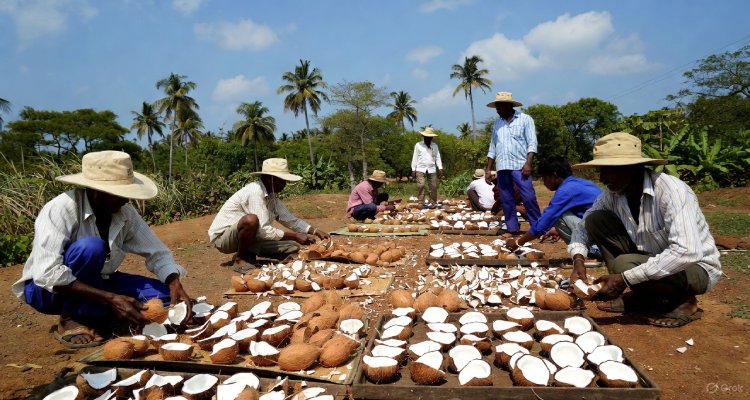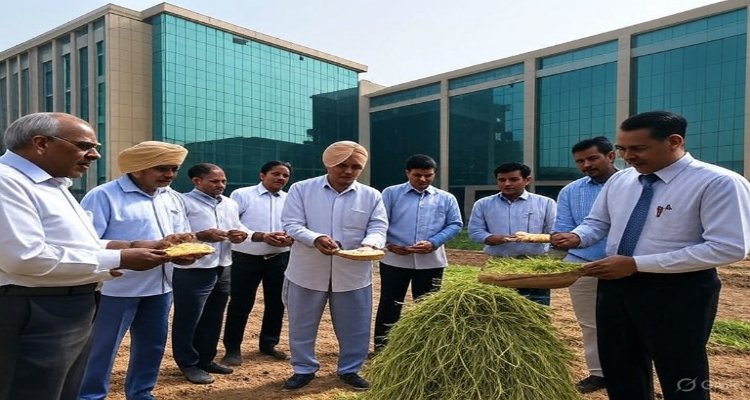The Role of NCEL in Boosting India’s Agricultural Exports
National Cooperative Exports Limited (NCEL) plays a crucial role in boosting India’s cooperative-led exports. Here’s how NCEL, in partnership with APEDA, is transforming farmer-driven trade.
Introduction: A New Era for India’s Cooperative Exports
India’s cooperative sector, often described as the backbone of rural development, is now stepping onto the global stage with a renewed mission. The creation of National Cooperative Exports Limited (NCEL) and its strategic partnership with the Agricultural and Processed Food Products Export Development Authority (APEDA) marks a pivotal moment for India’s farmers, producers, and rural enterprises. Together, they aim to transform cooperative-led agriculture into a powerful engine for export growth, directly linking local producers to international markets.
Context & Background: Why NCEL Was Established
NCEL was set up on January 25, 2023, under the Multi-State Cooperative Society Act, 2002, with the Union government’s approval. Functioning as an umbrella organization, it represents cooperatives of all sizes—primary to national—that aspire to enter export markets.
Promoted by leading cooperative giants such as Amul (GCMMF), IFFCO, KRIBHCO, and NAFED, along with the National Cooperative Development Corporation (NCDC), NCEL is designed to maximize the export potential of Indian cooperatives. With an authorized share capital of ₹2,000 crore and headquarters in New Delhi, NCEL is envisioned as a one-stop solution for financing, training, market intelligence, and branding support for cooperative-led exports.
Main Developments: The NCEL–APEDA MoU
The recently signed MoU between NCEL and APEDA represents a turning point in India’s agricultural export journey. While NCEL brings together the vast cooperative network, APEDA, created in 1986, provides decades of expertise in export promotion, product quality compliance, and international market development.
APEDA oversees exports of a wide range of scheduled products—from fruits, vegetables, dairy, poultry, and cereals to floriculture, herbal plants, and even processed food items. With its 16 regional offices, APEDA acts as a vital bridge between Indian producers and overseas buyers.
Through this partnership, NCEL gains access to APEDA’s technical knowledge, training modules, global quality standards, and policy support. In turn, APEDA leverages NCEL’s grassroots cooperative network to ensure that farmers and cooperatives across India are export-ready.
Expert Insight: What Industry Observers Are Saying
Agricultural trade experts believe this partnership has the potential to redefine rural livelihoods.
According to a senior policy analyst in the cooperative sector:
“NCEL’s structure ensures that small farmers are not left behind. By linking them with APEDA’s export facilitation, India is not only strengthening its international trade but also ensuring fair value realization for grassroots producers.”
Cooperative leaders have also expressed optimism, noting that export-led growth will bring better price stability for perishable products and open new avenues for branding Indian produce globally.
Impact & Implications: What Lies Ahead
The NCEL–APEDA collaboration is expected to:
- Empower Farmers: Training programs and workshops will familiarize farmers with international quality standards, food safety, and documentation.
- Boost Export Readiness: Cooperatives will be equipped to meet global demand for fruits, vegetables, dairy, spices, and processed foods.
- Enhance Branding & Market Positioning: NCEL will play a key role in building strong “Brand India” identities for cooperative products in global markets.
- Infrastructure & Capacity Building: Investment in storage, logistics, and trade fair participation will strengthen India’s export ecosystem.
- Support Rural Livelihoods: By securing premium value for produce, this partnership can enhance incomes and bring stability to rural communities.
In the long run, NCEL is set to become a crucial driver of the National Cooperation Policy, which envisions cooperatives as engines of sustainable and inclusive growth.
Conclusion: A Gateway to Global Markets
The establishment of NCEL and its partnership with APEDA represents more than just an organizational collaboration—it is a strategic vision for rural India’s global integration. By combining cooperative strength with export facilitation, India is laying the groundwork for farmers and small producers to directly access international markets, reap higher returns, and strengthen the country’s agricultural brand.
As NCEL evolves, its role will be critical in ensuring that India’s cooperative movement doesn’t just thrive domestically but also earns a strong global footprint.
Disclaimer : This article is for informational purposes only and does not represent official government communication.











